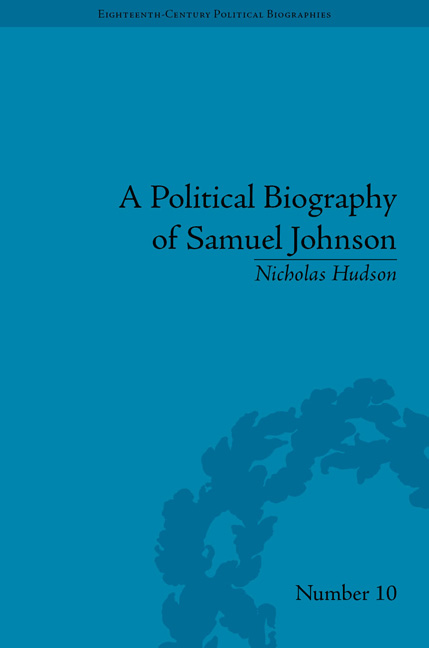Book contents
- Frontmatter
- CONTENTS
- Dedication
- Acknowledgements
- Note on the Text
- Introduction
- 1 Political Origins, 1709–36
- 2 The Patriot Opposition, 1737–9
- 3 An Independent Voice, 1740–55
- 4 The Seven Years War, 1756–63
- 5 Defender of King and State, 1763–70
- 6 Troubles of Empire, 1771–84
- Conclusion
- Notes
- Works Cited
- Index
6 - Troubles of Empire, 1771–84
- Frontmatter
- CONTENTS
- Dedication
- Acknowledgements
- Note on the Text
- Introduction
- 1 Political Origins, 1709–36
- 2 The Patriot Opposition, 1737–9
- 3 An Independent Voice, 1740–55
- 4 The Seven Years War, 1756–63
- 5 Defender of King and State, 1763–70
- 6 Troubles of Empire, 1771–84
- Conclusion
- Notes
- Works Cited
- Index
Summary
Thoughts on the Late Transactions respecting the Falkland's Islands
Johnson's political writing and commentary during the last fourteen years of his life are overshadowed by the great and paradoxical outcome of Britain's evolution during the eighteenth century. As the result of the Seven Years War, Britain had become what was now widely acknowledged to be an ‘empire’. Imperial expansion was not, however, an entirely happy state of affairs. Having accumulated a National Debt that historians estimate between £128 and £133 million, British politicians became preoccupied with the problem of how to balance public finances and lower taxes.1 The attempt to meet this financial goal through extraction of colonial income from America to India nonetheless met with repeated objection, complication and finally outright rebellion. The new first minister in charge of navigating this unprecedented endeavour, Lord North, would probably have flourished in a different era. He emerged from the Middlesex election crisis as the perfect royal servant, harmonious with the king yet able through wit and his unassuming style to impress the independent ‘country’ members who sustained the government's majority. He disdained the title of ‘Prime Minister’ and tried to create consensus in cabinet and in parliament by attending to financial details. The necessity of exerting British sovereignty over its territories nonetheless generated not only practical problems but a series of theoretical questions concerning the nature of imperial power itself.
- Type
- Chapter
- Information
- A Political Biography of Samuel Johnson , pp. 151 - 190Publisher: Pickering & ChattoFirst published in: 2014



